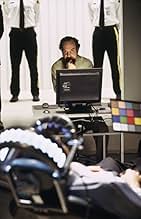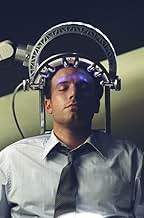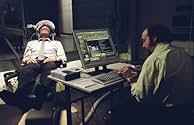IMDb-BEWERTUNG
6,3/10
114.516
IHRE BEWERTUNG
Aus einer genialen Idee wird eine Menschenjagd. Langsam erkennt er, warum er um sein Leben fürchten und flüchten muss.Aus einer genialen Idee wird eine Menschenjagd. Langsam erkennt er, warum er um sein Leben fürchten und flüchten muss.Aus einer genialen Idee wird eine Menschenjagd. Langsam erkennt er, warum er um sein Leben fürchten und flüchten muss.
- Auszeichnungen
- 3 Gewinne & 2 Nominierungen insgesamt
Dee Jay Jackson
- Guard
- (as Deejay Jackson)
Handlung
WUSSTEST DU SCHON:
- WissenswertesThis was Ben Affleck's biggest paycheck to date, earning him approximately $15 million. Whenever he's asked to why he starred in the film, he responds "The answer lies in the title".
- PatzerDuring the opening sequence, Jennings purchases a 3D monitor and copies the tech to create a new version that no longer needs the screen. The execs are amazed and rush it to product. But to do the reverse engineering, Jennings uses an interactive 3D hologram system much more advanced than the one he is designing.
- Zitate
Shorty: Maybe we should just find Decker.
Michael Jennings: I can't talk to Decker.
Shorty: Why not?
Michael Jennings: He had an accident.
Shorty: An accident?
Michael Jennings: Yeah, he, uh, he fell out of his bedroom window.
Shorty: He fell out of his... He *fell* out of his bedroom window!
- VerbindungenEdited into Paycheck: Deleted/Extended Scenes (2004)
- SoundtracksMinute Waltz in D Flat Major Op. 64 No. 1
by Frédéric Chopin
Performed by Lincoln Mayorga
Courtesy of Townhall Records
Ausgewählte Rezension
Rating: ** out of ****
I wonder what it says about the state of cinematic science fiction that most of author Philip K. Dick's adaptations generally mix high-octane action with its interesting sci-fi concepts. Paycheck is no exception, hardly a surprise when you note it's from once beloved Hong Kong filmmaker John Woo, who's quickly reaching Michael Bay/Roland Emmerich levels of notoriety in the U.S. with each regressive film.
To be fair, Paycheck isn't unenjoyable, and it even gets off to a pretty good start. Set sometime in the near future, there's not much of a noticeable difference with our present time except for a few elaborate-looking gadgets and computers. Ben Affleck stars as Michael Jennings, a reverse engineer who's hired by major corporations to build products superior to all rival companies. Afterwards, his memory is erased by a partner of his (Paul Giamatti) and he's given a large paycheck for his time and troubles (usually the whole process takes about three months).
His latest offer comes from an old friend of his (Aaron Eckhart), who promises an eight-figure deal at the end of the transaction. The catch is that the whole procedure will take three years. Despite some reluctance, he agrees to the deal and when the three years pass by, Jennings, thinking he's a rich man, is shocked to discover he gave up over ninety million dollars in favor of an envelope containing twenty everyday household items. Now he finds himself on the run from both the FBI and the company that hired him, and must set out to discover what he built during those three years he's missing.
Uma Thurman also stars in the movie as Jennings' girlfriend during that three-year span, but she factors so lazily into the picture, she's obviously only in the film so that a) Jennings can have a love interest and b) he can also have someone to talk to about every little discovery he makes. Then again, function "b" could have worked just as well with Giamatti, but everyone knows a "sexy" chick is a better sell (I have to put quote marks around sexy because Thurman looks positively haggard for almost every minute of screen time she's present; I can't help but feel the much hotter Kathryn Morris would have done better in the role).
There are two concepts in this movie that specifically intrigue me (some moderate spoilers here), the first one is choosing deliberately to erase your own memory, but the notion is forgotten after the first half-hour. I was quite curious to know exactly what the process is like to the subject. Take, for instance, the fact that he lost his memory over the three-year span. Does the last thing he remembers feel like a three-year old memory or an event that happened just a second ago? Instead, all we get is a half-hearted (actually, not even that much) attempt at a sorrowful romance because he can't remember his girlfriend and she's not very happy about that.
The other major sci-fi concept, the ability to see into the future, isn't explored with much more interest and it leads to a number of baffling questions. You see (quite a few spoilers here), it's revealed Jennings sent himself those twenty items because they can come in handy at a specific moment that'll help him survive or escape from a dangerous situation.
But the thing is, Jennings couldn't have known each item would come in handy unless he used the device he built at least twenty times, because there's no way he'd know a motorcycle would come in handy if he never had, say, the bus ticket to escape from the FBI, meaning he used the device to see what he needed to escape the FBI, but still foresaw that he'd be killed in even more future events. That would mean this guy was originally destined to die or get caught in well over ten different scenarios (i.e. he had the bus ticket to escape, but if he didn't have the motorbike keys, he wouldn't have gotten further, and so on and so forth), but this is never really addressed.
By John Woo standards, there's surprisingly only a modest amount of action in the film, but at least the material is competently handled, even if it's not entirely believable. What might work in movies that establish their characters as supercops with impeccable aims doesn't come off quite as well in action scenes that feature scientists beating up a large number of armed goons. But if you suspend disbelief, the action scenes are pretty fun (especially the motorcycle chase and the laboratory battle), and coupled with the relatively fast pace, keep the movie perfectly watchable despite the poor script and mediocre acting (I never got into specifics, but this is Ben Affleck and Uma Thurman we're talking about).
When all is said and done, Paycheck is a wasted opportunity and is never as memorable a mixture of science fiction, mystery, and action as Minority Report, but it's likely to do the trick for undemanding fans of any of these genres. If you expect more, well, you'd do best to remember this is John Woo we're talking about, not Steven Spielberg.
I wonder what it says about the state of cinematic science fiction that most of author Philip K. Dick's adaptations generally mix high-octane action with its interesting sci-fi concepts. Paycheck is no exception, hardly a surprise when you note it's from once beloved Hong Kong filmmaker John Woo, who's quickly reaching Michael Bay/Roland Emmerich levels of notoriety in the U.S. with each regressive film.
To be fair, Paycheck isn't unenjoyable, and it even gets off to a pretty good start. Set sometime in the near future, there's not much of a noticeable difference with our present time except for a few elaborate-looking gadgets and computers. Ben Affleck stars as Michael Jennings, a reverse engineer who's hired by major corporations to build products superior to all rival companies. Afterwards, his memory is erased by a partner of his (Paul Giamatti) and he's given a large paycheck for his time and troubles (usually the whole process takes about three months).
His latest offer comes from an old friend of his (Aaron Eckhart), who promises an eight-figure deal at the end of the transaction. The catch is that the whole procedure will take three years. Despite some reluctance, he agrees to the deal and when the three years pass by, Jennings, thinking he's a rich man, is shocked to discover he gave up over ninety million dollars in favor of an envelope containing twenty everyday household items. Now he finds himself on the run from both the FBI and the company that hired him, and must set out to discover what he built during those three years he's missing.
Uma Thurman also stars in the movie as Jennings' girlfriend during that three-year span, but she factors so lazily into the picture, she's obviously only in the film so that a) Jennings can have a love interest and b) he can also have someone to talk to about every little discovery he makes. Then again, function "b" could have worked just as well with Giamatti, but everyone knows a "sexy" chick is a better sell (I have to put quote marks around sexy because Thurman looks positively haggard for almost every minute of screen time she's present; I can't help but feel the much hotter Kathryn Morris would have done better in the role).
There are two concepts in this movie that specifically intrigue me (some moderate spoilers here), the first one is choosing deliberately to erase your own memory, but the notion is forgotten after the first half-hour. I was quite curious to know exactly what the process is like to the subject. Take, for instance, the fact that he lost his memory over the three-year span. Does the last thing he remembers feel like a three-year old memory or an event that happened just a second ago? Instead, all we get is a half-hearted (actually, not even that much) attempt at a sorrowful romance because he can't remember his girlfriend and she's not very happy about that.
The other major sci-fi concept, the ability to see into the future, isn't explored with much more interest and it leads to a number of baffling questions. You see (quite a few spoilers here), it's revealed Jennings sent himself those twenty items because they can come in handy at a specific moment that'll help him survive or escape from a dangerous situation.
But the thing is, Jennings couldn't have known each item would come in handy unless he used the device he built at least twenty times, because there's no way he'd know a motorcycle would come in handy if he never had, say, the bus ticket to escape from the FBI, meaning he used the device to see what he needed to escape the FBI, but still foresaw that he'd be killed in even more future events. That would mean this guy was originally destined to die or get caught in well over ten different scenarios (i.e. he had the bus ticket to escape, but if he didn't have the motorbike keys, he wouldn't have gotten further, and so on and so forth), but this is never really addressed.
By John Woo standards, there's surprisingly only a modest amount of action in the film, but at least the material is competently handled, even if it's not entirely believable. What might work in movies that establish their characters as supercops with impeccable aims doesn't come off quite as well in action scenes that feature scientists beating up a large number of armed goons. But if you suspend disbelief, the action scenes are pretty fun (especially the motorcycle chase and the laboratory battle), and coupled with the relatively fast pace, keep the movie perfectly watchable despite the poor script and mediocre acting (I never got into specifics, but this is Ben Affleck and Uma Thurman we're talking about).
When all is said and done, Paycheck is a wasted opportunity and is never as memorable a mixture of science fiction, mystery, and action as Minority Report, but it's likely to do the trick for undemanding fans of any of these genres. If you expect more, well, you'd do best to remember this is John Woo we're talking about, not Steven Spielberg.
Top-Auswahl
Melde dich zum Bewerten an und greife auf die Watchlist für personalisierte Empfehlungen zu.
Everything New on Prime Video in December
Everything New on Prime Video in December
Your guide to all the new movies and shows streaming on Prime Video in the US this month.
- How long is Paycheck?Powered by Alexa
Details
- Erscheinungsdatum
- Herkunftsländer
- Sprache
- Auch bekannt als
- Paycheck
- Drehorte
- Produktionsfirmen
- Weitere beteiligte Unternehmen bei IMDbPro anzeigen
Box Office
- Budget
- 60.000.000 $ (geschätzt)
- Bruttoertrag in den USA und Kanada
- 53.790.451 $
- Eröffnungswochenende in den USA und in Kanada
- 13.462.374 $
- 28. Dez. 2003
- Weltweiter Bruttoertrag
- 117.248.958 $
- Laufzeit1 Stunde 59 Minuten
- Farbe
- Sound-Mix
- Seitenverhältnis
- 2.39 : 1
Zu dieser Seite beitragen
Bearbeitung vorschlagen oder fehlenden Inhalt hinzufügen

Oberste Lücke
By what name was Paycheck - Die Abrechnung (2003) officially released in India in Hindi?
Antwort
























